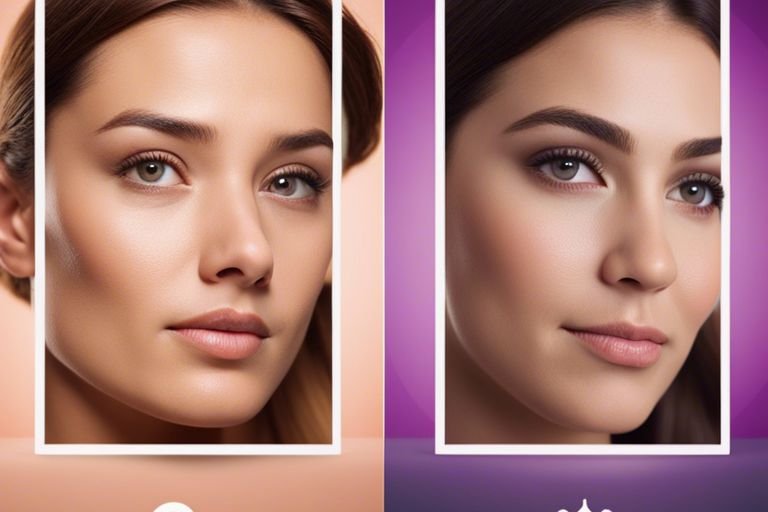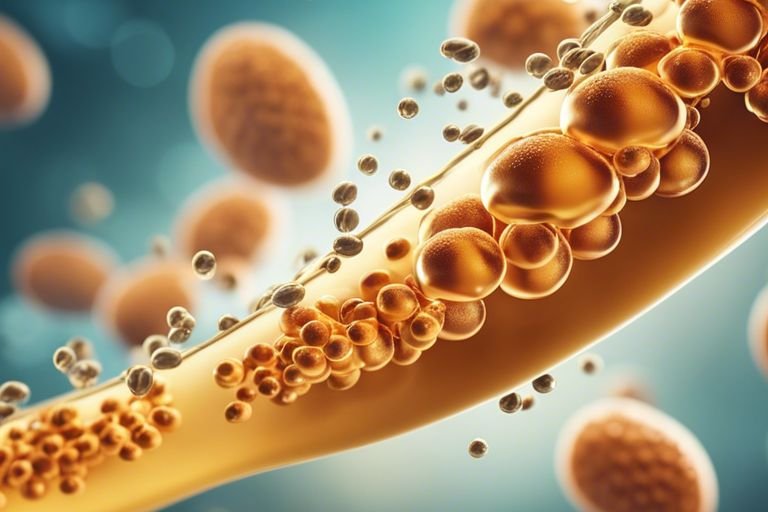As you navigate the complex landscape of acne treatment options, you may be wondering if there’s a missing piece to the puzzle. What if you could harness the power of nutrition to reduce the severity of your acne? Recent research suggests that omega-3 fatty acid intake may play a crucial role in alleviating acne symptoms. In this article, we’ll probe into the fascinating connection between omega-3 fatty acids and acne severity, exploring the latest scientific findings and what they mean for your skin health.
Key Takeaways:
- Omega-3 fatty acid intake has been shown to have a significant impact on acne severity. A study found that participants who followed the Mediterranean diet and took omega-3 supplements experienced significant reductions in inflammatory and non-inflammatory skin lesions.
- A staggering 98.3% of participants had omega-3 fatty acid deficits at the start of the study, highlighting the importance of adequate omega-3 intake for healthy skin. Reaching target omega-3 levels during the study led to significant improvements in acne severity.
- Lifestyle interventions, including dietary recommendations, should be considered a valuable adjunct to modern acne treatment plans, rather than an opposition to prescription medications. Future studies should build on these findings to improve dietary recommendations for acne patients.
The Link Between Omega-3 Fatty Acids and Acne
Before stepping into the specifics, it’s vital to understand the connection between omega-3 fatty acids and acne severity. Research has shown that omega-3 fatty acid intake can have a significant impact on acne severity, and this chapter will explore the underlying mechanisms behind this relationship.
Omega-3 Deficiencies and Acne Severity
Fatty acid deficiencies, particularly omega-3, have been linked to various skin issues, including acne. In fact, a staggering 98.3% of participants in a study published in the Journal of Cosmetic Dermatology had omega-3 fatty acid deficits at the start of the study. This deficiency was associated with increased acne severity, highlighting the importance of adequate omega-3 intake for healthy skin.
The Role of Omega-3 in Inflammation and Skin Health
Fatty acid metabolism plays a crucial role in regulating inflammation, which is a key factor in acne development. Omega-3 fatty acids, in particular, have potent anti-inflammatory properties, which can help reduce inflammation and promote healthy skin.
Omega-3 fatty acids have been shown to modulate the production of pro-inflammatory eicosanoids, which are hormone-like substances that promote inflammation. By reducing the production of these pro-inflammatory molecules, omega-3 fatty acids can help alleviate inflammation and reduce acne severity. Furthermore, omega-3 fatty acids have been found to promote the production of anti-inflammatory cytokines, which can help soothe and calm the skin. By understanding the role of omega-3 fatty acids in inflammation and skin health, you can better appreciate the significance of adequate omega-3 intake for managing acne.

The Study: A Closer Look
Assuming you’re interested in understanding the connection between omega-3 fatty acid intake and acne severity, let’s explore the details of a recent study published in the Journal of Cosmetic Dermatology.
Methodology and Participant Demographics
Look at the study’s design: it involved 60 individuals with mild to moderate acne, who were instructed to follow the Mediterranean diet and take omega-3 fatty acid supplements. The researchers aimed to investigate the effects of this intervention on acne severity and quality of life.
Results: Reduced Acne Severity and Improved Quality of Life
Quality of life improved significantly for participants who reached target omega-3 fatty acid levels during the study. Notably, acne severity lessened substantially in this group.
Acne severity decreased dramatically, with significant reductions in both inflammatory and non-inflammatory skin lesions. Moreover, an impressive 98.3% of participants had omega-3 fatty acid deficits at the start of the study, highlighting the importance of addressing these deficiencies in acne treatment plans. By the end of the study, participants who reached target omega-3 fatty acid levels experienced a marked improvement in their acne severity, underscoring the potential benefits of omega-3 supplementation in acne management.
The Impact of Omega-3 on Acne
Your skin is a complex ecosystem, and omega-3 fatty acids play a crucial role in maintaining its health. Research has shown that omega-3 intake can have a significant impact on acne severity, and understanding how it works can help you make informed decisions about your skincare routine.
Anti-Inflammatory Effects of Omega-3
Antioxidant-rich omega-3 fatty acids have potent anti-inflammatory properties, which can help reduce inflammation in the skin. This is particularly important for acne-prone skin, as inflammation can exacerbate acne symptoms and lead to more severe breakouts.
Omega-3 and Skin Lesion Reduction
Effects of omega-3 on skin lesions have been studied extensively, and the results are promising. In a recent study, participants who took omega-3 supplements and followed the Mediterranean diet saw significant reductions in inflammatory and non-inflammatory skin lesions.
Omega-3 fatty acids have been shown to reduce inflammation and promote healing in the skin, which can lead to a decrease in acne severity. By incorporating omega-3 rich foods or supplements into your diet, you may be able to reduce the appearance of acne lesions and improve the overall health of your skin. The study mentioned earlier found that 98.3% of participants had omega-3 fatty acid deficits at the start of the study, highlighting the importance of adequate omega-3 intake for healthy skin.
The Importance of Dietary Interventions
Once again, the significance of dietary interventions in managing acne severity cannot be overstated. While topical and oral medications may provide temporary relief, a well-balanced diet rich in omega-3 fatty acids can have a profound impact on your skin health.
The Mediterranean Diet and Acne Prevention
On the heels of numerous studies highlighting the benefits of the Mediterranean diet, it’s clear that this eating pattern can play a crucial role in acne prevention. By incorporating whole foods, fruits, vegetables, and healthy fats into your diet, you can reduce inflammation and promote a balanced gut microbiome, both of which are vital for healthy skin.
Omega-3 Supplements: A Valuable Adjunct to Acne Treatment
Adjunct therapies, such as omega-3 supplements, can significantly enhance the efficacy of your acne treatment plan. As demonstrated in the Journal of Cosmetic Dermatology study, supplementing with omega-3 fatty acids can lead to significant reductions in inflammatory and non-inflammatory skin lesions.
Treatment outcomes can be drastically improved when omega-3 supplements are combined with a balanced diet and other acne treatments. By addressing omega-3 deficits, you can reduce inflammation, promote healthy skin cell growth, and ultimately, alleviate acne severity. As Dr. Anne Guertler notes, lifestyle interventions, including dietary recommendations, should be considered a valuable adjunct to any modern acne treatment plan.

Expert Insights and Future Directions
Now that we’ve probed into the connection between omega-3 fatty acid intake and acne severity, let’s hear from the experts and explore the future directions of this research.
Corresponding Author Anne Guertler’s Perspective
Author Dr. Anne Guertler emphasizes the significance of incorporating lifestyle interventions, such as dietary recommendations, into modern acne treatment plans. She highlights the importance of considering these interventions as valuable adjuncts to prescription medications, rather than opposing approaches.
Building on the Foundation: Future Study Recommendations
Anne Guertler suggests that future studies should build upon the current findings by employing a randomized, placebo-controlled design to improve dietary recommendations for acne patients.
Foundation studies like this one have laid the groundwork for further investigation. You may be wondering what’s next in this line of research. Future studies could probe deeper into the specific mechanisms by which omega-3 fatty acids influence acne severity, or explore the optimal dosage and duration of omega-3 supplementation for acne treatment. Additionally, researchers could investigate the potential synergistic effects of combining omega-3 supplements with other lifestyle interventions, such as stress management or exercise, on acne outcomes.
The Bigger Picture: Omega-3 and Overall Health
Despite the promising results of omega-3 fatty acid intake on acne severity, it’s imperative to consider the broader implications of omega-3 on your overall health. As you explore the connection between omega-3 and acne, you may be wondering how this nutrient affects other aspects of your well-being.
A recent study found that Omega-3 fatty acids found to significantly reduce acne in new study, but omega-3’s benefits extend far beyond skin health. Let’s research into the ways omega-3 fatty acids impact your cardiovascular health and brain function.
Omega-3 and Cardiovascular Health
An abundance of research has demonstrated the cardioprotective effects of omega-3 fatty acids. By incorporating omega-3 rich foods or supplements into your diet, you can reduce inflammation, improve blood lipid profiles, and lower your risk of heart disease.
Omega-3 and Brain Function
To better understand the connection between omega-3 and brain health, consider the fact that your brain is composed of approximately 60% fat, with omega-3 fatty acids being a crucial component. Omega-3’s have been shown to support cognitive function, memory, and mood regulation.
Overall, the benefits of omega-3 fatty acids on brain function are multifaceted. They have been found to reduce symptoms of depression, anxiety, and attention deficit hyperactivity disorder (ADHD), while also supporting healthy brain development and function throughout your lifespan.
To wrap up
Conclusively, you now have a better understanding of the significant link between omega-3 fatty acid intake and acne severity. As demonstrated by the study, incorporating omega-3 rich foods and supplements into your diet can lead to notable improvements in acne symptoms and overall quality of life. By recognizing the importance of omega-3 fatty acids in acne treatment, you can make informed decisions about your dietary choices and potentially reap the benefits of clearer, healthier skin.
FAQ
Q: Can omega-3 fatty acid intake affect acne severity?
A: Yes, research suggests that omega-3 fatty acid intake can affect acne severity. A study published in the Journal of Cosmetic Dermatology found that participants who followed the Mediterranean diet and took omega-3 fatty acid supplements experienced significant reductions in inflammatory and non-inflammatory skin lesions, as well as improved quality of life.
Q: What was the outcome of the study on omega-3 fatty acid intake and acne severity?
A: The study found that 98.3% of participants had omega-3 fatty acid deficits at the start of the study. However, acne severity lessened significantly in those who reached target omega-3 fatty acid levels during the study. This suggests that increasing omega-3 fatty acid intake can lead to improved acne outcomes.
Q: What do the study’s findings imply for acne treatment?
A: The study’s findings suggest that lifestyle interventions, including dietary recommendations, should be considered a valuable adjunct to any modern acne treatment plan. This means that healthcare providers may want to consider recommending omega-3 fatty acid supplements or dietary changes as part of a comprehensive acne treatment plan. Further research is needed to confirm these findings and improve dietary recommendations for acne patients.

[…] With these beverages, you can expect to see improvements in your skin’s texture, tone, and overall appearance. Pomegranate juice, for example, has been shown to increase collagen production, reducing the appearance of fine lines and wrinkles. Cranberry juice, on the other hand, has antibacterial properties that can help prevent acne and other skin issues. By incorporating these drinks into your diet, you’ll be well on your way to achieving a youthful, radiant glow.Link Between Omega-3 Fatty Acid Intake and Acne Severity. […]